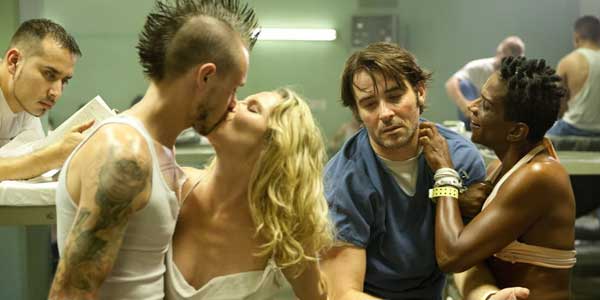
Director: Jules Stewart
Running Time: 88 mins
Release Date: March 15th 2013

When K-11 was in development, there was talk of Twilight stars Kristen Stewart and Nikki Reed starring in the movie. However they left the film behind, but we’re still left with a pretty good cast including Goran Visnjic, Kate Del Castillo, Portia Doubleday, D.B. Sweeney, Jason Mewes and Tommy ‘Tiny’ Lister.
The film follows Visnjic’s Raymond Saxx Jr., who wakes up after a heavy night of drink and drugs locked up in K-11. He can’t remember how he got there and doesn’t really know where he is, initially thinking he’s in some sort of institution, as he seems to presume that’s the sort of place that would be full of drug-dealing homosexuals and transsexuals.
However K-11 is actually the section of the Los Angeles County Jail reserved for LGBT people, and Raymond has been mistakenly put in there despite being straight. It’s ruled over by the fiery transsexual Mousey who along with her minions (including the drug-dealing Ben, played by Kevin Smith cohort Jason Mewes) keeps order. As Ray begins to get his bearings and slowly comes to realise why he was locked up, he starts to negotiate his new surroundings, including a brutal child molester played by Tiny Lister and D.B. Sweeney’s corrupt, rapist guard, who thinks he’s in charge of the inmates, but they might disagree.
K-11 takes on an interesting subject but with mixed results. The performances are pretty good and the characters are fairly interesting, however it takes a while to get going, which harms the movie when it finally gives us out bearing and moves forward with the plot. The film wants to put you in the same position as Visnjic, so you don’t know where you are or what’s going on. Initially this disorientation is effective, as you’re thrown into an unfamiliar world of fierce transsexuals and camp convicts. However the discombobulation goes on for too long, so you spend much of the movie trying to work out exactly what’s going on and how this insular world works.
It means that by the time Raymond figures things out and decides to act, everything has to move at lightning speed. At that point it’s difficult to keep up, or indeed work out whether everything he’s doing is a good thing or not.
The film also skates a thin line between painting its transsexual characters as strong, independent women, and making them seem like damaged freaks. It’s easily arguable that transgender people who end up in prison are likely to be somewhat damaged, but a casual viewer could come away with the impression that they’re scary weirdos. Presumably the idea is Raymond comes in with prejudices and preconceptions and then learns to respect his LGBT prison cohorts, but it doesn’t fully work.
K-11 is fairly engaging though, keeping you hooked in enough that you’ll want to know what happens next, even when what does happen isn’t entirely convincing.
Overall Verdict: An intriguing, well-acted movie that starts out well but keeps its disorienting tricks up for a little too long, so that it undermines the ending. An LGBT section of prison is a fascinating place to set a film, but K-11 is only partially successful.
Reviewer: Tim Isaac





Leave a Reply (if comment does not appear immediately, it may have been held for moderation)